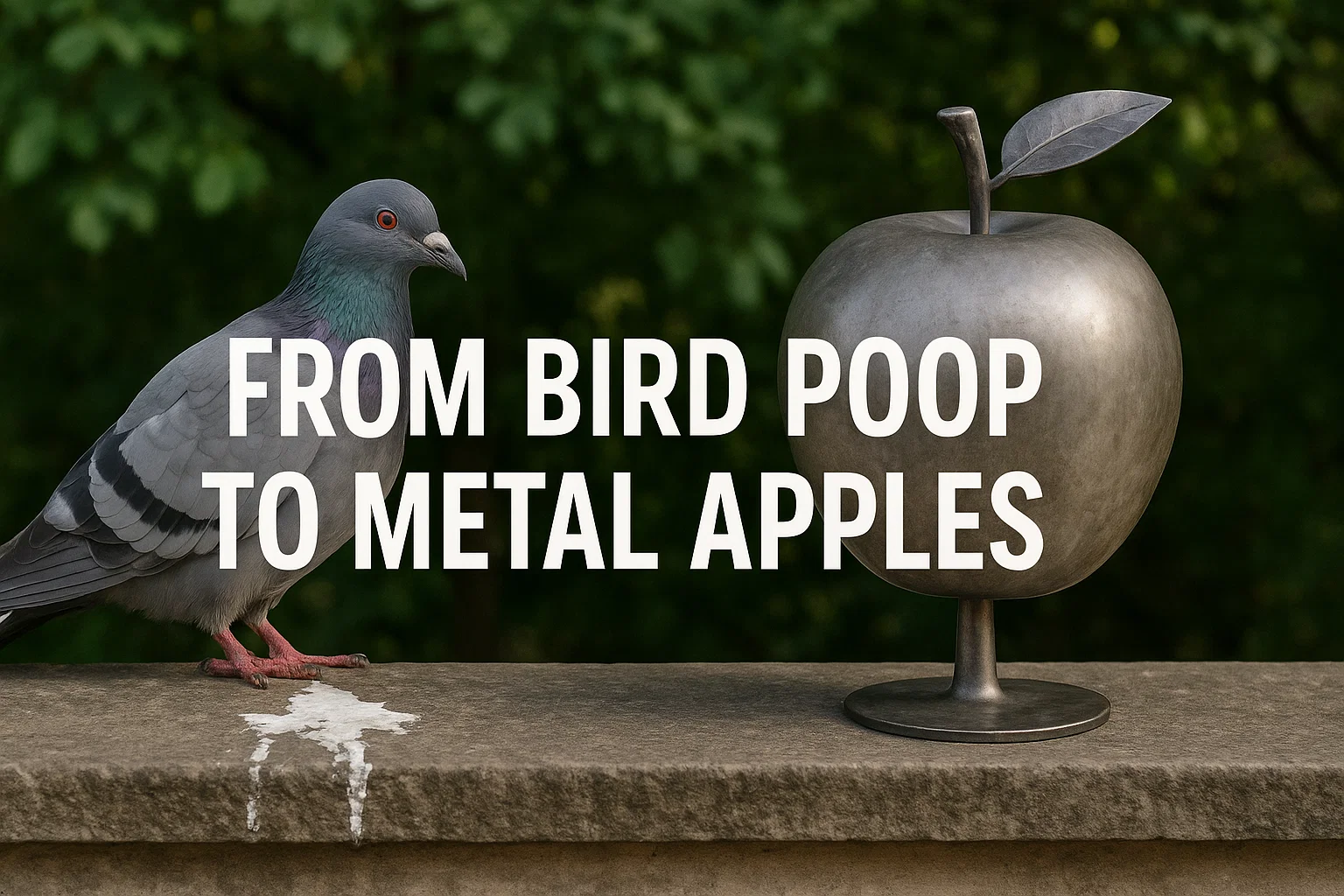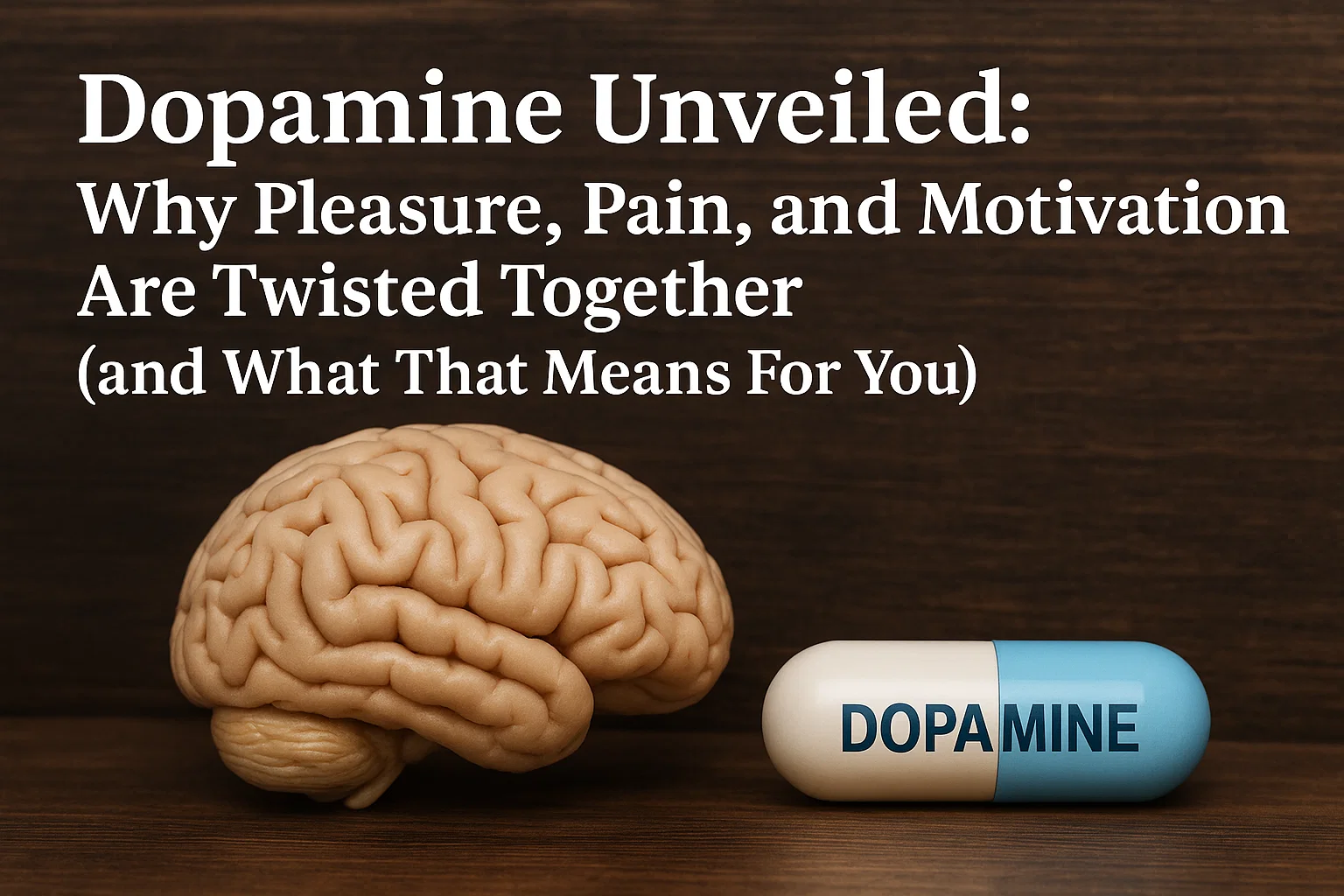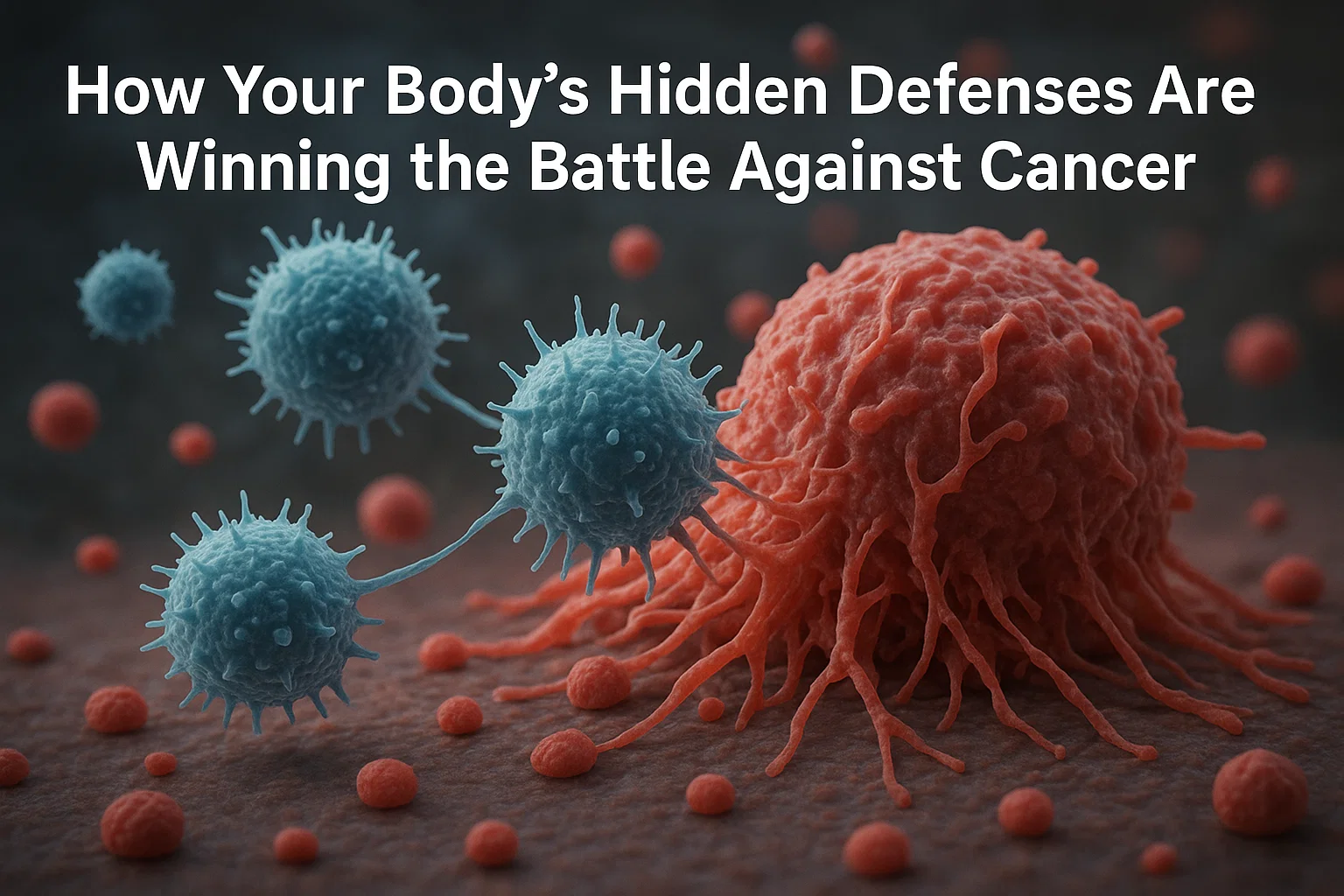
Let me tell you about the time my neighbor, a supposedly healthy marathon runner, got a terrifying stage four cancer diagnosis—only to bounce back thanks to some surprising changes. That story blew my mind and made me start digging: is cancer really as random as it seems? Turns out, our bodies are in a constant battle we rarely see—fighting off potential cancers and diseases daily, largely thanks to systems baked right into us. In this post, you’ll get a front-row seat into these everyday microscopic battles, discover why some health missteps of the past still haunt us, and find out how science (and even your grocery list) holds the key to a longer, high-quality life. Along the way, expect a few curveballs—like the amount of plastic you might unknowingly eat every week.
Microscopic Wars: Your Body’s 10,000 Daily Cancer Battles
Every Day, 10,000 Tiny Mistakes
Did you know that, every single day, your body quietly makes about 10,000 genetic mistakes? That’s right. Each of these is technically a “microscopic cancer.” Sounds scary, but don’t panic yet.
Let’s break it down. Your body is made up of roughly 40 trillion cells. That’s a number so big, it’s almost impossible to picture. Imagine a city where every person is a cell, and you’d still be nowhere close. Each cell is constantly copying its DNA, like a student frantically copying notes before the bell rings. But, just like students, sometimes they mess up.
DNA: The Ultimate Copy-and-Paste Job
DNA replication is like an endless copy-and-paste marathon. And, just like when you copy text on your computer, mistakes slip in. These are called mutations. Most are harmless. Some, though, could start a problem—like a typo that changes the meaning of a whole sentence.
Here’s where things get wild: “Cancers are like pimples in our body.” That’s how Dr. William Lee puts it. Not every pimple becomes a problem, right? Same with these microscopic cancers. They pop up, but most never grow big enough to even notice.
Your Body’s Spellcheck: The Immune System
Luckily, your body has its own spellchecker. The immune system is constantly patrolling, scanning for errors, and fixing them before they cause trouble. It’s like having a team of editors working 24/7, catching most of the mistakes before they hit “publish.”
But sometimes, a few slip through. Maybe the spellcheck misses a typo, or maybe it’s just too busy. That’s when a mutation can stick around. Still, you don’t get sick from most of these. Why?
“The reason that we don’t become more sick from all kinds of diseases, including cancer, is because our body is hardwired with its own health defense systems.” – Dr. William Lee
Why Aren’t We All Sick All the Time?
It’s a fair question. If we’re making 10,000 mistakes a day, why aren’t we constantly at the doctor’s office? The answer: most mutations are harmless, or your body catches them before they become a problem. Only a tiny fraction ever grow into something dangerous.
Here’s a mind-bender: the smallest breast cancer you can detect is about 1 cm across. That’s already 1 billion cells. Think about how many microscopic “cancers” never get that far.
A Personal Tangent: Cells Aren’t Lego Blocks
I used to imagine my cells as little Lego blocks, just sitting there. Turns out, they’re more like a chaotic construction site. Pieces are flying everywhere, blueprints are getting smudged, and the workers (your immune cells) are constantly fixing mistakes. It’s messy. It’s noisy. But it works.
The Invisible Battle, From Day One
This microscopic war isn’t new. It’s been raging since you were a kid. Cancer isn’t as random as it seems—your body’s been fighting it off since before you could walk.
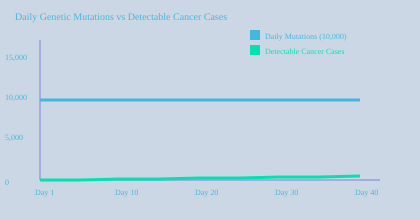
Decades of Trouble: Industrialization, Plastics & the Fallout in Our Health
The Ghosts of the 50s, 60s, and 70s: What Did We Really Inherit?
Ever look back at old family photos and think, “Life seemed simpler then”? Maybe you picture home-cooked meals, kids playing outside, less noise from screens. But there’s a twist. The choices made in those decades—especially around food, industry, and our environment—are still shaping your health today.
Dr. William Lee put it bluntly:
“We are presently seeing the fallout of some of the not so good moves that we made in the 1950s and 60s and 70s.”
That’s not just nostalgia talking. It’s science catching up with history.
Industrialization: The Double-Edged Sword
- Food Processing: The rise of packaged, shelf-stable foods made life easier. But it also meant more additives, preservatives, and less real nutrition.
- Environmental Degradation: Factories boomed. So did pollution. Chemicals and plastics seeped into air, water, and soil.
- Lifestyle Changes: More cars, more screens, less movement. Fast food replaced slow dinners. Convenience won, but at a hidden cost.
Plastics: The Unseen Ingredient in Your Diet
Here’s a fact that’s hard to swallow—literally. Modern humans may now consume up to a credit card’s worth of plastic every week. Yes, you read that right.
“People might consume as much as a credit card’s worth of plastic every single week, which is very worrying.” – Dr. William Lee
Microplastics are everywhere: in water, food, even the air you breathe. No one really knows the long-term effects yet, but the idea alone is unsettling.
Chronic Disease: The Legacy We Didn’t Ask For
You’d think with all the health information out there, rates of cancer, diabetes, and heart disease would be dropping. But the numbers tell a different story:
- Chronic diseases are on the rise. Even as awareness grows, so do diagnoses.
- Life expectancy stagnated around 2020. For the first time in decades, the upward trend paused.
- Our bodies are dealing with new threats. Plastics, chemicals, processed foods—these weren’t problems for your grandparents.
Personal Side Note: The Price of “Simpler Times”
I’ll admit it. Sometimes I long for those “good old days.” But now, that nostalgia comes with a pang. The hidden costs—polluted rivers, junk food, microplastics—weren’t obvious then. Now, they’re impossible to ignore.
Charting the Fallout: Chronic Disease & Industrial Milestones
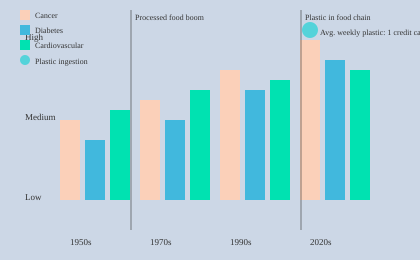
Key Takeaways
- Decisions from decades ago still affect your health today.
- Modern life means more plastics and more chronic disease.
- Even with more information, the numbers aren’t improving—yet.
So, next time you hear someone pine for the “good old days,” maybe pause. The real story? It’s complicated. And you’re living with the results, every single day.
Your Body’s Defense League: Why We Aren’t All Sick All the Time
Why Aren’t You Sick Right Now?
Ever wondered why, with all the germs and dangers floating around, you’re not constantly battling illness? It’s not luck. It’s your body’s hidden defense league working overtime. Every single day, your DNA makes tiny mistakes—little blips that could, in theory, cause chaos. Yet, you’re mostly fine. Why?
Your innate defense systems are on patrol, 24/7. They’re like a tireless police cruiser, always on the lookout for trouble. Dr. William Lee puts it perfectly:
“Kind of like a police cruiser patrolling a quiet neighborhood…”
Your immune system spots microscopic cancers and other threats before you even know they exist. It’s not just about fighting off colds. It’s about catching disease before it goes rogue.
Think of Your Immune System as a Police Cruiser
Let’s break it down. Imagine your body as a quiet neighborhood. Most days, nothing seems to happen. But behind the scenes, your immune system is patrolling. It sees a suspicious cell—maybe a microscopic cancer. Like a cop spotting a shady character, it swoops in, removes the threat, and keeps the peace.
- Microscopic cancers? Your immune system finds and destroys them before they grow.
- Daily DNA mistakes? Patched up, cleaned out, or neutralized.
- Infections? Neutralized before you even feel sick.
It’s not perfect. Sometimes, threats slip through. But most of the time, you never notice. That’s how good your body is at self-defense.
Personal Analogy: The Dog and the Mouse
Here’s a story. My dog once sniffed out a mouse in my cupboard. I had no idea it was there. But she did—long before I saw any signs. That’s your body. It detects and removes threats before you ever know they’re there. Most of the time, you’re blissfully unaware.
Why Medical Research Is Shifting Focus
Here’s the real breakthrough: Instead of just treating disease, scientists are now studying how our bodies maintain health. It’s not just about fixing what’s broken. It’s about understanding—and supporting—what already works.
Dr. Lee says it best:
“None of them are as powerful as what the body is hardwired to do by itself.”
Even the best medicine can’t outmatch what healthy biology does naturally. That’s why protecting and boosting your natural defenses is so important.
Quick Facts: Your Body’s Hidden Work
| Main Defense System | How It Works |
|---|---|
| Immune System Patrolling | Continuous, from birth to last breath |
| Smallest Feelable Cancer | 1 cm mass = 1 billion cells |
What Harms Your Defenses? What Helps?
- Harms: Poor sleep, stress, smoking, unhealthy food, lack of exercise.
- Boosts: Nutritious diet, regular movement, good sleep, stress management, avoiding toxins.
So, next time you feel healthy, remember: your body’s defense league is on duty. Quietly, constantly, and with more skill than any medicine we’ve invented so far.
Food vs. Pharma: Surprising Discoveries in Beating Cancer at Its Roots
When Food Steps Into the Lab
Imagine you’re in a high-tech lab. Scientists are searching for the next big cancer drug. Suddenly, someone suggests, “Let’s swap out half the drugs… and use food instead.” Sounds wild, right? That’s exactly what Dr. William Lee’s team did. Even he was skeptical at first. But the results? They made his jaw drop.
Why? Because in some cases, food didn’t just match the drugs—it actually outperformed them. Let that sink in for a second.
Foods That Starve Cancer
Here’s something you probably didn’t expect: over 200 foods have been scientifically shown to help starve cancer. Not obscure, hard-to-find ingredients either. The top five? You can pick them up at your local grocery store. No prescription needed.
- Broccoli (yes, that green stuff you avoided as a kid)
- Berries (blueberries, raspberries, strawberries—take your pick)
- Tomatoes
- Green tea
- Walnuts
These foods aren’t just “healthy.” They’re powerful. They can cut off the blood supply to cancer cells, basically starving them out. That’s not just a theory—it’s been shown in real experiments.
Mother Nature vs. Modern Medicine
Here’s where things get really interesting. The pharmaceutical industry has been chasing a dream: finding a drug that can kill cancer stem cells. These are the “root” cells that make cancer so hard to beat. As Dr. Lee puts it:
‘The holy grail in the pharmaceutical industry is to find something that can kill cancer stem cells.’ – Dr. William Lee
But so far, no drug has managed it. Not one. And yet, some foods can do what billion-dollar research hasn’t. As Dr. Lee says:
‘Mother nature beat us to the punch.’ – Dr. William Lee
It’s humbling, isn’t it? All this technology, all these pills—and broccoli might be ahead of the curve.
Changing How You See Your Plate
Let’s be honest. Even knowing all this, you might still crave pizza. I do. There’s nothing wrong with enjoying your favorites. But now, when you look at your plate, you might start to wonder: what’s really medicine here? Is it the crust and cheese, or the handful of spinach on the side?
It’s not about guilt. It’s about awareness. Every bite is a choice. Sometimes, it’s a wild card—would you eat more broccoli if you knew it could outperform lab-made drugs? Maybe. Maybe not. But now you know what’s possible.
Quick Recap: Food’s Secret Power
- Over 200 foods have anti-cancer properties.
- The top 5 are easy to find and easy to eat.
- No drug kills cancer stem cells yet, but some foods can.
- Real experiments show food can rival, even beat, certain cancer drugs.
- It’s okay to crave pizza—just remember what’s truly powerful on your plate.
So next time you’re at the store, maybe toss an extra bag of broccoli in your cart. You never know—you could be holding the world’s most underrated medicine.
The Anatomy of Chronic Disease: Cardio, Diabetes, Dementia, and Beyond
What’s Really Driving Chronic Disease?
You hear about heart disease, diabetes, and dementia all the time. But do you ever wonder why these conditions are so common now? Or why your doctor keeps talking about “lifestyle changes”? Let’s break it down.
1. Cardiovascular Disease: The Relentless #1
Cardiovascular disease isn’t just a statistic. It’s the #1 killer in developed countries. And it’s not just about genetics. What you eat, how much you move, and even how you handle stress—these things matter. A lot.
‘If you look at the biggest health crises in the world today in developed countries, you’re really talking about cardiovascular disease being the number one killer, diabetes, and all the consequences.’ – Dr. William Lee
Think about it: every meal, every snack, every late-night fridge raid. It all adds up. Sometimes, it’s easy to forget that your daily choices are shaping your heart’s future.
2. Diabetes: The Domino Effect
Diabetes isn’t just about sugar. It’s about unstable blood sugar over time. When your body can’t regulate sugar properly, it starts a chain reaction—what some experts call metabolic chaos.
- Eye disease
- Wounds that won’t heal
- Kidney problems
- Even increased cancer risk
It’s like knocking over the first domino and watching the rest fall. The consequences? They’re not just numbers on a chart. They’re real, and they’re everywhere.
3. Dementia & Inflammation: The Silent Surge
As societies age, dementia is becoming more common. But why? Chronic inflammation is a big part of the story. It’s sneaky. You don’t feel it at first. But over years—maybe decades—it chips away at your brain’s defenses.
And here’s the kicker: long-term dietary missteps (think: too much sugar, not enough veggies) make it worse. My grandfather used to say, “Sugar’s the root of all evil.” I rolled my eyes. Turns out, he wasn’t that wrong.
4. Are We Winning or Losing?
Here’s a question: Are chronic diseases slowing down, or are they speeding up? You might hope for the former, but the numbers tell a different story. Around 2020, life expectancy in many developed countries hit a plateau. It’s like we’ve reached a ceiling—and chronic disease is a big reason why.
| Condition | Key Fact |
|---|---|
| Cardiovascular Disease | #1 killer in developed nations |
| Diabetes | Sustained high blood sugar; many downstream complications |
| Life Expectancy | Plateau noted circa 2020 |
Quick Takeaways
- Diet and lifestyle are deeply intertwined with chronic disease risk.
- Unstable blood sugar doesn’t just cause diabetes—it triggers a cascade of problems.
- Inflammation is more than a buzzword. It’s a root cause for many chronic conditions.
- Trends suggest we’re not out of the woods. Prevention matters more than ever.
So, next time you reach for that extra cookie or skip your walk, remember: your body’s defenses are working overtime. Give them a hand. Or at least, don’t make their job harder.
Changing the Trajectory: The Promising Power of Individual Choices
Small Choices, Big Impact
Ever wonder if your daily habits really matter? The truth is, they do. Every time you choose what to eat, decide to take the stairs, or even pick when to go to bed, you’re shaping your body’s future. These aren’t just random acts—they’re votes for your long-term health.
- What you eat: That apple or bag of chips? It’s not just about calories. It’s about giving your body the tools to fight off disease, sometimes before you even know it’s there.
- How you move: A short walk, a stretch, or a quick dance in the kitchen. Movement keeps your cells alert and your defenses sharp.
- When you rest: Sleep isn’t just downtime. It’s when your body repairs, recharges, and quietly battles threats you can’t see.
Action Step: Tweak Just One Habit
Here’s something you can do right now: pick one daily habit and tweak it. Maybe swap a sugary snack for a handful of nuts. Or walk an extra block after lunch. It sounds tiny, almost laughable. But science says these small changes add up.
“A decision that you can make after this… could actually help you for the rest of your life.”
– Dr. William Lee
Why the Little Stuff Matters
You might not see results tomorrow. Or next week. That’s normal. The effects of positive habits can take years—sometimes decades—to really show. But they’re happening, quietly, in the background.
Think of it like planting a tree. You don’t get shade the first day. But give it time, and you’ll have a cool spot to rest for years. Your health works the same way.
My Own Tiny Shift
Let me share something personal. I started small, too. I swapped out one processed snack a day for a handful of nuts. At first, it felt almost pointless. But, honestly, I stuck with it. Turns out, science backs me up—these little tweaks can help your body’s defenses stay strong. It’s not about perfection. It’s about progress.
Stacking Up for a Longer, Better Life
There’s no magic bullet. No single move that guarantees a disease-free future. But every small step stacks up. Over time, these choices can mean the difference between a disease staying microscopic or becoming a real threat.
- Immediate changes—even after reading this—are powerful. Science supports small, steady tweaks.
- Individual actions now have evidence behind them. They can help prevent or even reverse certain diseases.
- Lifespan vs. healthspan: It’s not just about living longer, but living better. More energy, fewer aches, more good days.
Science Says: Compounding Returns
Here’s the kicker: even minimal positive changes, especially in what you eat, provide compounding health returns. That means the benefits keep growing, year after year. It’s like interest in a savings account, but for your body.
So, next time you’re about to make a choice—big or small—remember, you’re not just living for today. You’re investing in all your tomorrows.
FAQ: Your Burning Questions About Cancer, Chronic Disease, and Taking Control
Let’s wrap things up with some of the most common—and honestly, most pressing—questions people have after learning about the body’s hidden defenses. If you’re feeling a bit overwhelmed, you’re not alone. The science is fascinating, but it can also leave you with more questions than answers. So, let’s break it down, one question at a time.
1. What does it really mean that we’re “all making cancer” constantly?
It sounds scary, doesn’t it? But here’s the truth: every day, your body’s cells make mistakes when copying DNA. Dr. William Lee puts it at about 10,000 errors every 24 hours. Each mistake is a potential “seed” for cancer. But—here’s the good news—your body’s defense systems are constantly on patrol, finding and destroying these abnormal cells before they become a problem. Most of the time, you never even know it’s happening. Think of it like a superhero team working behind the scenes, cleaning up messes before you ever notice.
2. Is plastic in food a legitimate health risk or blown out of proportion?
Unfortunately, it’s not hype. Research shows that microplastics are everywhere: in your food, water, and even inside your body. Some studies estimate you could be eating a credit card’s worth of plastic every week. That’s wild. And it’s not just gross—Dr. Lee points out that plastics in your blood vessels can raise your risk of heart attack or stroke by up to 400%. So, while you don’t need to panic, it’s smart to use glass or ceramic instead of plastic, especially for hot foods and drinks. Small changes matter.
3. Are foods really as powerful as some drugs in stopping cancer?
Surprisingly, yes. Certain foods can “starve” cancer by blocking the growth of blood vessels that feed tumors—a process called anti-angiogenesis. Dr. Lee’s research shows that foods like green tea, coffee, onions, garlic, and berries can be as effective as some medications at this. It’s not magic; it’s biochemistry. The right foods help your body’s natural defenses do their job. But remember, food isn’t a replacement for medical treatment. It’s a powerful ally, not a miracle cure.
4. Can someone already diagnosed with chronic disease still benefit from lifestyle changes?
Absolutely. It’s never “game over.” Dr. Lee has seen patients with advanced cancer go into remission by supporting their body’s defenses with better food, sleep, and stress management. The same goes for heart disease, diabetes, and more. Even small changes—like adding more leafy greens or cutting back on processed foods—can make a real difference. Your body is always trying to heal. Give it a hand.
5. How do I even start making better choices—without feeling overwhelmed?
This is the big one, right? The truth is, you don’t have to overhaul your life overnight. Start with one thing: maybe swap a plastic water bottle for glass, or add a handful of berries to your breakfast. Try not to chase perfection. As Dr. Lee says, “Highlight and enjoy the foods you love from the list of health-promoting options.” If you slip up, don’t stress. Just get back on track. Over time, these small steps add up. Your body will thank you.
So, what’s the takeaway? Your body is already fighting for you—every single day. The choices you make can either help or hinder that fight. You don’t need to be perfect, just proactive. Trust your defenses, support them with good food, sleep, and mindful habits, and you’ll be raising your shields for the long run.
TL;DR: Your body is waging secret wars against disease every day. Support it with science-backed habits: eat smart, understand your risks, and act early—because longevity is more about micro-decisions than you think.

